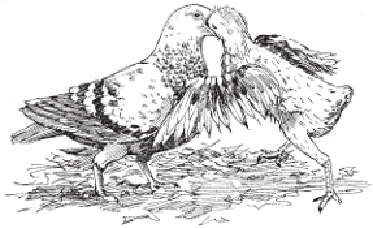Agriculture Reference
In-Depth Information
Pigeon parents feed their offspring pigeon milk for several weeks after birth.
Pigeons take care of their young longer than most other birds. They typically lay only
two eggs, and once they hatch care for their offspring for nearly two months. The young
are born rather helpless and are dependent upon Mom and Dad to provide feed for them
during this time. You can't incubate pigeon eggs in an incubator and then raise them
yourself, as the young require the specialized food called
pigeon milk
, the regurgitated
food from Mom or Dad's crop. The young live off of this for the first few weeks of their
life until they
fledge
(fly and leave the nest). It is customary for raisers to start with
young, fledged adults or adult pairs.
Feed
Pigeons and doves are primarily seedeaters and thus require a source of grit to help their
gizzard work its digestive magic. You only need to provide grit if your birds are wholly
confined; they find sufficient material if allowed to fly free. Even if they have time out
of their shelter, however, they also need a source of calcium, so oyster shells should be
made available free-choice.
Pigeons and doves find a great deal of their own food when given the time to fly and
exercise, but it is still important that you provide them with a balanced ration. The ideal
feed for breeding pigeons contains 30 percent yellow or green peas; 15 percent balanced
breeding ration protein pellets for poultry; 20 percent wheat; 25 percent whole-kernel,
small-seed-type corn; and 10 percent safflower. A well-balanced ration provides healthy
adults a better chance at producing multiple batches of young per year.
Must-Fly Zone
Flight pens or the freedom to fly at will are requirements for kept pigeons and doves.
They need the exercise to build body strength. Unfortunately, many people view pigeons
as a nuisance; raisers frequently discover that their pigeons haven't returned after a day

